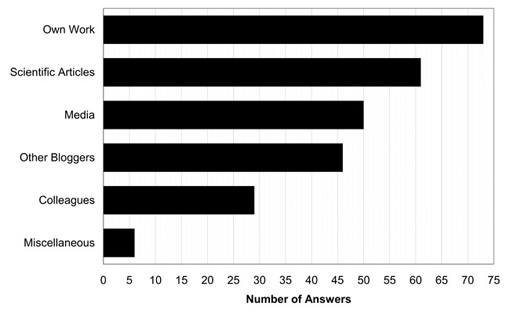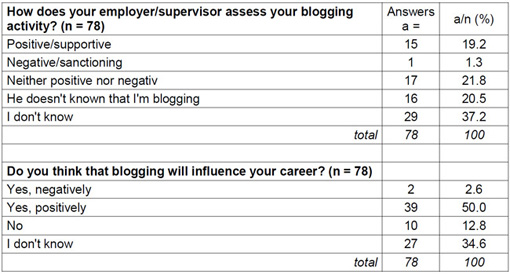Why do you blog about your research? Why do you read other blogs? Does blogging improve your employability? Are there hidden advantages to blogging?
How would you convince an undergraduate to start blogging?
I’m giving a talk during Edinburgh’s ominous ‘Innovative Learning Week’ on how and why to blog about your research (more details here). One of the key messages I hoped to convey was that blogging helps your research by crowd-sourcing criticism: If you put something up on the web, someone might help you.
So there I was trying to come up with reasons about why you should blog, when I realised: I could put the talk online and see if anyone helps. Insight fail.
So, why do you blog? Has it helped your career?
So far, my main source of facts about the question above has been Geißler et al. 2011, who survey geoscience bloggers. They find, in line with the general blogging community, that the majority of bloggers are male, and about half are from the USA. Graduate students and university faculty make up the largest proportion, with freelancers and industry bloggers coming next. There are proportionately few undergraduates who blog.
The most stated reasons for writing for a blog are to share knowledge, to popularise the field, to have fun and to improve writing abilities.
Here’s their results for the sources of inspiration and perception of blogging:
I was trying to find some information on the extent to which your career is helped by blogging. Andy Hollyhead is doing his PhD on this, but I can’t get access to his publications. There are some great comments on the post Has science blogging affected your career? at the AGU blogosphere. When I found this one, I stopped looking:
Brian Shiro:
Science blogging has opened doors and set into motion a cascade of events that have completely changed my life and the trajectory of my career for the better. To make a long story short, I have been able to pursue a number of projects and experiences of direct relevance to my ultimate goal of becoming an astronaut thanks to my blog.
But now over to you – how would you convince an undergraduate how to blog?
You can view my current progress on my slides here.
My talk: Blogging about research
23 Feb 2012 11:00 – 12:00
Room 1.17, Dugald Stewart Building, University of Edinburgh.
[gview file=”http://blake.ppls.ed.ac.uk/~s0451342/BloggingResearch_forRT2.pdf”]
Lutz Geißler, Robert Huber and Callan Bentley (2011). The state of the Geoblogosphere – geoscience communication in the social web geonetzwerk
Cox, S., & Hollyhead, A. (2009). The Development of Student Blogging in Higher Education CERI 2009




There’s this: http://blogs.lse.ac.uk/impactofsocialsciences/2011/11/15/world-bank-dissemination/
… and that is the power of blogging. 15 minute response!
Hi Sean,
I run http://www.languageonthemove.org – by the sound of it an atypical blogging collective: almost all of us are women and except for 1 team member based outside North America. I’ve published about my motivations for research-blogging here:
Piller, I. (2011). “Dinosaur Publishing.” Modern Language Journal 95(4): 647-649.
These motivations can be summed up as follows: the future (and moral obligation) of knowledge dissemination is to make it free, Web-based, collaborative, and multilingual.
You might also want to mention to your students that blogging is great for procastinators: while writing a dissertation may seem too daunting and is easily put off another day, there is no excuse not to write up a blog post. As such it’s a bit like drafting, and has, as you say, the inbuilt benefit of allowing for instant feedback. So I think it actually enhances ‘research productivity. I, for instance, have just signed a book contract based on http://www.languageonthemove.org 🙂
My research-blog post (www.languageonthemove.com/language-globalization/english-and-asean) was picked up by Bangkok Post which subsequently republished it as an opinion piece (www.bangkokpost.com/opinion/opinion/279415/the-great-english-language-deficiency-hype). From there, other websites started to repost the BB article and it’s gone viral. I’ve been receiving an overwhelming number of responses, ranging from extremely supportive comments from big shots in my field to the interested publish, some of whom completely disagree with my view in the blog post. My MA students are not seeing the concrete example of the glocal power of research-blogging;-)
Oh now, a serious typo! I meant to say “My MA students are *now* seeing the concrete example of the glocal power of research-blogging;-)
I think why a lot of undergraduates don’t blog because they don’t have their own personal research to relate to, for many of my fellow undergraduates, peer-reviewed research is reserved for presentations and term papers, and exists in its own world until they get to the graduate level and start contributing to it.
As for me, I started blogging as an undergraduate because I started reading the articles that various professors from my college had published, because I wanted to approach them about possible research-based internships. I had thought that blogging about other articles that I found interesting in my spare time would help me remember the literature as a future scientist, and that when any graduate program googled my name the first thing they would see is me discussing peer-reviewed research and critiquing the methods.
I encourage my fellow undergraduates to science blog for those same reasons, it gets you acquainted with and helps you remember research in your field, turns Google into a good reference on your behalf instead of a possible employment hazard (maybe from overzealous facebooking), and creates a tangible example when any future interviewer asks why you say you communicate well.
I know I brought up my blog several times in my veterinary school interview, and I frequently mention it in job interviews as I believe it shows that I’m always learning and developing my presentation skills. Who wouldn’t want to accept or hire a student who is reading and reporting on the literature without being coerced? Of course, if your presentation goes well and other undergrads jump on board, I’ll lose that advantage, so don’t get too many of them excited :).
Oh, and you can tell them about the blogging community, you learn so much when you may only write a couple posts a month, but tons more when you check out the new stuff on researchblogging.org every day. You find awesome posts just like this one.
@Jason G. Goldman: I read the paper, and while it does show that blog posts can dramatically affect the number impact of the research it mentions, I was wondering if there was evidence that being a blogger improves your employability
Although the next few posts are full of cases of just this! I hadn’t thought of publishing the blog posts directly – Language log and Babel’s dawn have done this, too.
@Ingrid Piller: Lots of good points – I hadn’t thought about multilingualism (and I’m supposed to be studying it!). I remember Jeff Pullum talking about the lack of female bloggers, too. Why do you think this is the case, and what’s your secret?
@Austin J. Bouck: I think you’re right about the reasons undergraduates don’t blog – I had to tell my students about Google Scholar the other day. But you’re also right that, in today’s climate, anything to get a foot in the door is an advantage.
Damn, I was just trying to find more information on gender balance in blogging when I was referred to one of my own posts. That’s another thing blogging is good for – helping you remember what you’ve already done.
Hannah supplied this paper on gender balance in blogs by Dave Munger. It also links to this list of women in science blogging.
The article suggests that women aren’t being asked to contribute to blogs, but there’s not much explanation of why more women don’t choose to start their own.
Hi Sean,
What it really comes down to here is again the discussion of introducing more and more accepted altmetrics to the scientific process, such as blog posts, tweets, public reviews, etc. The biggest issue here is obviously making research institutions accepts these altmetrics as a measure of a person’s qualification (besides publications, talks, etc.).
There is a _lot_ of discussion going on about this topic at the moment, I guess a good starting point would be http://altmetrics.org together with some of the tools listed on that site, as well as the #altmetrics hashtag on Twitter.
It’s not an easy task, but it’s certainly an exciting one 😉
Take care,
Martin
I think blogging has definitely affected my academic and career choices/success. It was through blogging that I managed to get a grant from Edinburgh Beltane to go to the Science Communication Conference, and it was that conference that probably resulted me in ending up in the field of science communication in which I currently find myself in full time employment. I think my history blogging definitely helped me get my current job. It is a great way to convince employers and potential supervisors that you are passionately, actively and sincerely enthusiastic enough to dedicate your spare time to writing about it. Of course I’m not a typical example regarding employers valuing blogging experience because my job involves blogging a wee bit, but I think the point stands.
I think I’ve said on here before that the thing that worries me about blogging the most is the fear that I might get stuff wrong. However, experience has shown me that what you gain far outweighs any embarrassment when commenters do point out your mistakes, not only does this result in the binning of shit ideas, it contributes to the birth and growth of good ones and in the past has contributed to arguments which have eventually ended up in essays, reports, experiment ideas and even my MSc dissertation. You also occasionally get input from really high profile academics who you would never otherwise have access to.
Other awesome stuff I’ve got out of blogging includes; a press pass during the Edinburgh Science Festival, all expenses paid trip to London, exposure to future employers/supervisors who use social media and like-minded friends.
Apologies for not noticing the trackback to my own blog.
The ‘biggest’ paper when I was researching undergraduate blogging is available at http://www.nuigalway.ie/bis/sigsand2006/sigsand-proceedings-galway-2006.pdf (from about p55). Some of the assumptions made there, in particular about the critical success factors, may appear a little naive, but the paper may still be useful.
My PhD is less about undergraduate blogging, and centered more around e-portfolios in the workplace… a development from the traditional blog.
@Andy Hollyhead: Thanks for the link! Is there anywhere we can find more about your current work?
I think that blogging at undergraduate level is a different ball game to blogging as a post graduate research student. There really in nothing stopping undergrads blogging apart from lack of confidence and not really knowing what to say. But blogging about postgrad research can be tricky; dealing with supervisors who want to keep everything under wraps, working out copyright issues; impact on IP and future ability to market ideas or products; working in a university system that doesn’t understand “open”….and so on. What would you say are the advantages of blogging say…as a PhD candidate?
Sarah – The biggest advantage that I’m hoping that will come out of blogging as a PhD candidate is in getting a job. Not only can I cite science communication in my CV, but the people who are interviewing me might acually have heard of me before the interview. Better yet, if there’s a post out there on crazy correlations involving language and social strucutre, they might find me. It’s a kind of cloud-promotion scheme.
You’re quite right that there are challenges to blogging as a postgraduate, and they tend to differ by field. Certainly there’s always a danger of someone stealing your ideas, or running an experiment before you. I’ve been criicised before for putting stuff up on the web that wasn’t intended to be public (by accident and I soon fixed this). However, in the field of language evolution, it’s less of a concern. Perhaps because it’s relatively young and so there are not that many people working on it. I can imagine it being quite different for an extension of a known experimental paradigm where there are plenty of labs already set up to run it. The modelling work though, because it’s more mathematical, I feel safer putting it up since it’s more objectively accurate. Much progress in pure mathematics is done online outside of publication, and one advantage of instant publication is you can stake a claim to an idea.
There are problems with blogging as an undergraduate, too. One of the things I covered in my talk was plagliarism when it comes to putting up work that’s for an assessed course. It’s a fine line to tread, but Edinburgh university at least doesn’t stop you putting your work online, but does warn you that it could be copied by others.
However, most of the stuff that I write about are side-projects that I don’t really have time to go into myself. I hope that by putting it on the web, someone might want to collaborate (which has happened), or people will do some of the research legwork for me by suggesting readings or data sources. But this is just my bias, I’m much better at starting things than I am at finishing them!
Hi Sean,
I’m a biology undergrad thinking about starting a blog with entries about scientific articles I’ve read for my course. What are the ‘rules’ about using images from those papers in my blog? What about other images from the web if I provide credit to the source?
Thanks, Belinda
Belinda: I assumed that images from papers could be used under ‘fair use’ (http://en.wikipedia.org/wiki/Fair_use). There have been cases of people trying to sue people who’ve used their images, but these tend to be artistic works, and only instigated by a small minority. I’d think that publishers and authors would be happy for their graphs etc. to be used as long as you reference them properly.
Informative blog post . Just to add my thoughts if people a FL DoR RT-6 , my colleague edited a blank document here
http://goo.gl/0if1tc